Yeovil People
James Huntley Knight VC
Soldier, enlisted as Henry James Knight
James Huntley Knight was born on 5 November 1878 in Park Street and on 3 December 1878 was baptised at Holy Trinity church. He was the son of cloth weaver Huntley Knight (b1853, Kingswood, Gloucestershire, the "Natural Son" of Ann Freeman) and his wife Alma. Huntley Knight died in June 1878 and was buried in Wiltshire on 22 June 1878 - four months before the birth of his son. In the 1881 census, two-year-old James was recorded living with his grandparents in Addlewell Lane.
Little is known of James' very early life, although he may have experienced a difficult childhood since the 1891 census recorded him as a 13-year-old 'inmate' at the Industrial School at Milborne Stileham, Blandford, Dorset. (Industrial Schools were intended to help those children under 14 years old who were found to be homeless or begging, but who had not as yet committed any serious crime. The idea was to remove the child from bad influences, give them an education and teach them a trade.)
In 1892, at the age of 14, he enlisted in The King's (Liverpool) Regiment as a band boy under the name of Henry James Knight.
 On
21 August 1900,
21-year-old
James was
serving as a
Corporal in No 1
Company, First
Battalion, The
Kings
(Liverpool)
Regiment, 4th
Division Mounted
Infantry,
involved in Boer
War operations
in an area
called Van
Wyke’s Vlei east
of Pretoria.
On
21 August 1900,
21-year-old
James was
serving as a
Corporal in No 1
Company, First
Battalion, The
Kings
(Liverpool)
Regiment, 4th
Division Mounted
Infantry,
involved in Boer
War operations
in an area
called Van
Wyke’s Vlei east
of Pretoria.
For "gallantry in the face of the enemy" during these operations, he was awarded the Victoria Cross, as follows -
![]()
"War Office,
January 4, 1901.
The Queen has
been graciously
pleased to
signify Her
intention to
confer the
decoration of
the Victoria
Cross on the
undermentioned
Non-Commissioned
Officer, whose
claims have been
submitted for
Her Majesty's
approval, for
his conspicuous
bravery during
the operations
near Van Wyk's
Vlei, as stated
against his name
:—
1st Battalion
Liverpool
Regiment. No. 1
Company, 4th
Division Mounted
Infantry.
Corporal H J
Knight
On the 21st
August, during
the operations
near Van Wyk's
Vlei, Corporal
Knight was
posted in some
rocks with four
men covering the
right rear of a
detachment of
the same Company
who, under
Captain Ewart,
were holding the
right of the
line.
The enemy, about 50 strong, attacked Captain Ewart's right and almost surrounded, at short range, Corporal Knight's small party. That Non-Commissioned Officer held his ground, directing his party to retire one by one to better cover, where he maintained his position for nearly an hour, covering the withdrawal of Captain Ewart's force, and losing two of his four men.
He then retired, bringing with him two wounded men. One of these he left in a place of safety, the other he carried himself for nearly two miles.
The party were
hotly engaged
during the whole
time."
![]()
On 1 July 1903, 24-year-old Sergeant James Huntley Knight VC married 23-year-old Carrie Ellen Smith (b 17 January 1880 - 1957) at her village church at Milborne St Andrew, Dorset, halfway between Dorchester and Blandford. Carrie was the daughter of labourer Henry William Smith and his wife Eliza Ann.
After 19 years army service he retired from the regiment. James (as Henry James) was discharged from the army on 16 May 1912. However, following the outbreak of the Great War he enlisted on 25 August 1914 in the 11th (Empire Battalion) Royal Fusiliers, later renumbered 17th Royal Fusiliers, and was rapidly promoted Regimental Sergeant Major.
On 18 January 1915 he was commissioned as temporary Lieutenant in the 20th Battalion Manchester regiment (formed on 7 November 1914 as the 5th City or Pals Battalion). James was promoted temporary Captain on 5 March 1915. and put in command of 'A' Company and later 'D' Company.
In early 1915 there were reports of a scandal involving contracts to civilians for work and services at the recently built Warlingham Camp of the Royal Fusiliers, involving illegal payments. Apparently the order having been placed for building huts and other work, one of two committee members acting on behalf of himself and the other, went to the contractor and demanded a share of his profits. After some considerable reluctance the contractor agreed to concede one-third. The contract was performed during the month of September 1914 and from time to time the contractor made payments to one of these men, who received them on behalf of himself and the other man.
Captain Knight
of the 20th
Manchesters,
having earlier
held a
responsible
position in the
battalion, was
called to give
evidence at a
Military Court
of Enquiry
regarding the
civilian
contractors but
only in the
manner in which
they did their
work. In his
evidence he made
the point that
food was never
insufficient,
but it was badly
cooked as the
authorities had
appointed a
master-cook who
did not know his
work and might
as well have
been a
bricklayer. He
also stated that
inspecting
officers never
went to the huts
when they were
leaking and that
the men had been
seen floating
paper boats in
the water inside
their huts. His
evidence was
undoubtedly
true, albeit
tinged with
sarcasm, and was
not accepted by
the Court of
Enquiry. Captain
Knight then
withdrew his
remarks. In
December 1915 it
was announced
that there were
to be no
charges. All
this must have
had a profound
effect on Knight
and on 10
October 1915 he
relinquished his
commission - no
reason being
made public.
He then
re-enlisted the
following month
as a Private,
under his own
name of James
Huntley Knight
in the London
Scottish Regt.
On 9 January
1916, after
re-enlisting
once again, he
embarked with
the 1/14th
Battalion London
Scottish for
France and the
Western Front.
Two months later
he was appointed
Lance Corporal
and promoted
Corporal on 28
March, a rank
which he had
last held some
twenty-seven
years earlier.
He was wounded
in his left leg
on 22 June 1916
at Gommecourt in
the Somme.
Repatriated to
England on 27
June and
medically
discharged from
the army on 15
March 1917 as
ceasing to
fulfill Army
Physical
Requirements. So
ended
twenty-four
years of
virtually
unbroken service
to Queen, King
and Country.
He spent the remainder of his life in his wife's home village of Milborne St Andrew, Dorset. He was a friend of T E Lawrence who lived nearby, and was actively involved with the local branch of the British Legion.
On 25 November 1918, James and Carrie had a son, Howard.
One blot on James' name occurred in June 1920 when he was tried at Dorchester. He was fund guilty of "Forgery and Uttering". He was sentenced to six months imprisonment without hard labour. For details, see the Gallery below.
In the 1920 Electoral Register, James and Carrie were recorded living at High Street, Milborne St Andrew, Dorset. The 1939 Register also recorded James, Carrie and Howard living at High Street. James was recorded as an Army Pensioner, Colour Sergeant of the King's Regiment as well as an active Air Raid Precaution Warden. Carrie listed her occupation as 'unpaid domestic duties' while Howard gave his as a farm assistant.
James died on 24 November 1955 and his medals were later presented to The King's Regiment for safe keeping. Carrie died on 3 December 1957. There is a memorial to James and Carrie in the church yard at Milborne St Andrew - see below.
GALLERY

The record of the baptism of James Huntley Knight on 3 December 1878 from the Holy Trinity parish register.
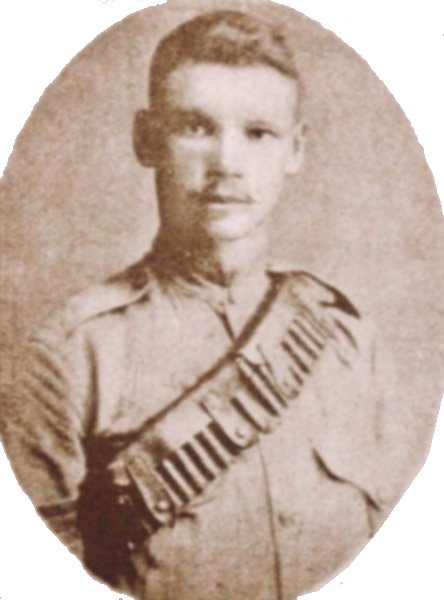
Probably photographed around 1900 when 21-year-old James was serving as a Corporal in South Africa. Seen here wearing the uniform of No 1 Company, First Battalion, The King's (Liverpool) Regiment, 4th Division Mounted Infantry.

James and Carrie's 1 July 1903 marriage recorded in the Milborne St Andrew parish register.
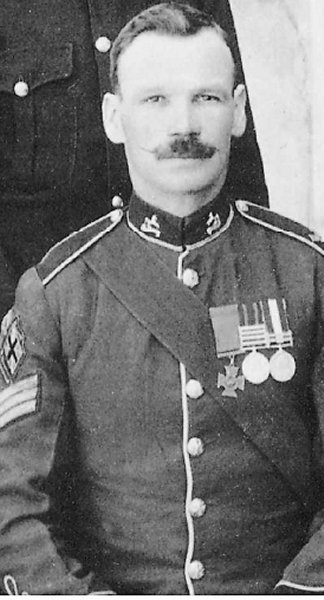
Colour Sergeant Henry James Knight VC 1878-1955
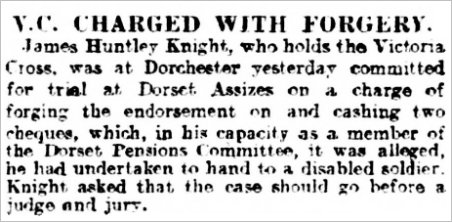
James was charged with forgery as reported in the 27 April 1920 edition of the Edinburgh Evening News.

The left-hand page of the UK Calendar of Prisoners, showing 42-year-old James' details. Below is the right-hand page detailing his offences, verdict and sentence.
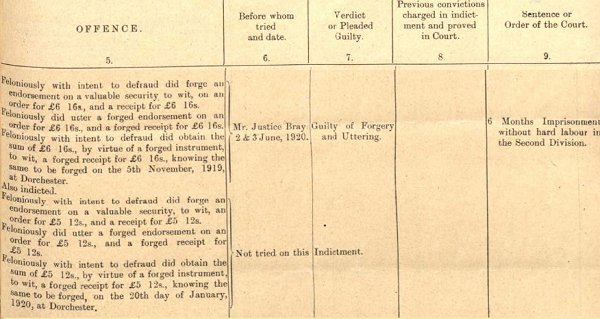
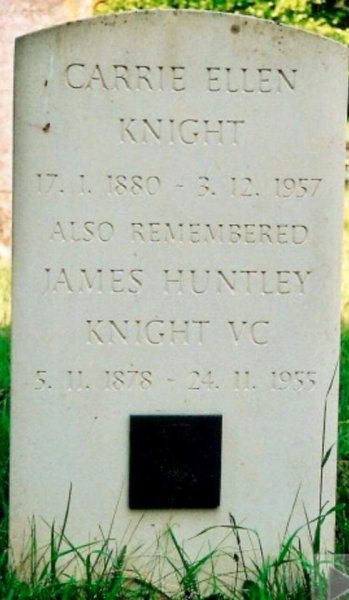
The memorial to James and Carrie in the church yard at Milborne St Andrew.